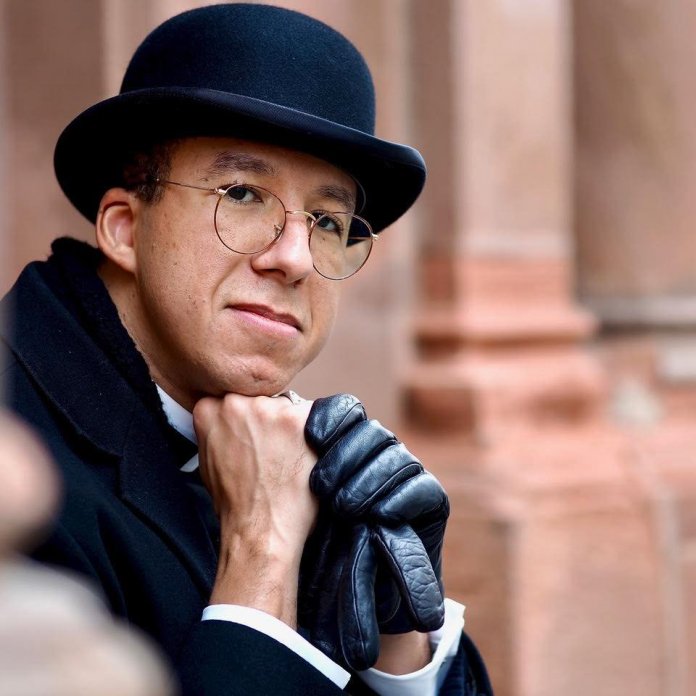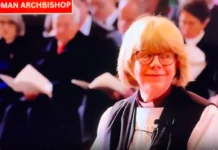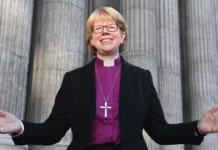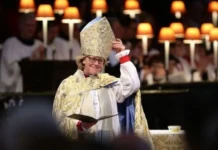It was a boneheaded move.
With one conversation at Mere Anglicanism in South Carolina, the debate over the ordination of women in the Anglican Church in North America has been reignited and forever changed, perhaps in ways that will prove historic. The proponents of the ordination of women had played all their cards, and what we saw, we can’t unsee. The Rev. Jeffrey Miller, director of the Mere Anglicanism Conference, and the Rt. Rev. Chip Edgar, his bishop, called Father Calvin Robinson into the green room and gave him a scolding. He was very right to ask “Why do I feel like I’m in the headmaster’s office.” And Jeffrey Miller was right to reply “Because, to some extent, you are.” The conference organizers had expected Father Robinson, a black priest from England, to speak to the question of critical race theory. It turns out, that wasn’t what they had asked for at all. In fact, in asking Father Robinson to speak at the conference, they had simply asked for a talk on “Critical Theory and its origins… as well as address why Critical Theory and the Gospel are irreconcilable meta narratives.”
Being an astute and bold speaker, Father Robinson did precisely that, relating to the audience not only the origins and pedigree of Critical Theory in the world of ideas, but also relaying how current challenges in the ecclesiastical landscape are included in that pedigree, most especially feminism. It was a full-throated appeal for the Church to return to the Gospel and the Faith once delivered to the saints, especially with regard to the Anglican Church in North America’s pet progressive project – the ordination of women. With no theological or historical response, the Rev. Miller accused Father Robinson of a personal betrayal, of going “off topic,” and of “rattling the cage.” Then, they took the bold move of disinviting him to be part of a panel at the end of the conference. It is fair to say that Father Robinson had been canceled, deplatformed (as the kids say), and I think – disciplined, for breaking the unwritten rules of civility. I should note that the rules of civility are often used as a cudgel against people of color in America. It’s a way to preserve the status quo, to keep people that do not know the ways of white society out of it. But Calvin Robinson has debated in the Oxford Union, he not only knows the rules of civility, he knows them better than those who are trying – with ridiculous obsequiousness – to police him.
Speaking of obsequiousness. Much has been written in the last week from all corners. Statements have been put out by two ACNA bishops, who wrote, not to apologize for the treatment of a man who gave a learned and fair talk, but to reassure the clergy of their dioceses, especially women, that they were valued and defended. I might point out that the two letters read as predictably cliched “apologies” on behalf of victims. First we have a response from Bishop Chip Edgar (of the host diocese), who wrote to the clergy of the Diocese of South Carolina:
The Anglican Church in North America, and the Anglican Diocese of South Carolina, and I, as bishop, are deeply committed to the idea that both those who favor women’s ordination, and those who oppose it, do so in fidelity to scripture and are both welcomed and valued in our common life. We refer to this recognition of both positions throughout the ACNA with the unwieldy moniker, “dual integrities.” While that is a less than helpful designation, it points to the deep reality that both views ought to be held with integrity, are welcome, respected, and will be defended on either side.
Bishop Edgar went on to describe Father Robinson’s plenary talk as “demeaning.”
Then, we have a response from Bishop Todd Hunter (ordinary of Churches for the Sake of Others), which if I may be honest is a fine bit of virtue signaling.
It needs to be reinforced today because of derogatory comments toward women clergy made by a speaker at last week’s Mere Anglicanism, one of the most notable conferences within the ACNA. I did not attend the conference, and I did not hear the talk, but several C4SO leaders have brought the matter to my attention.
Today I saw a letter from Bishop Chip Edgar of the Anglican Diocese of South Carolina to his clergy. I cite it here as an example of best practices within the challenge of “dual integrity.”
Our women pay a high price for being in ACNA. On the matter of Holy Orders, they are talked about but rarely listened to. For men in ACNA, dual integrities is a concept. For women, it can be a dehumanizing tool for rejection.
At this point, if it wasn’t clear already, the gloves are off.
Those who hold the traditional and catholic position on the matter no longer have any grounds to believe that we will be tolerated. We have no grounds to believe that we can speak the truth in mixed company without fear of reprisal and cancelation. When Bishop Edgar says that traditionalists oppose women’s ordination “in fidelity to scripture” and are “welcomed and valued in our common life” I don’t believe him. Why should I believe someone who says one thing and does another? Why should I believe someone who has shown that the only acceptable way to hold the traditional position is to not talk about it. After all, Father Robinson talked about it, in a way that was respectful, and in line with his conscience, and it was called “demeaning.”
What I think bishops Edgar and Hunter are saying is “We all know who the dehumanizing, demeaning, and derogatory people are in this room. And it’s not us.” All the while, they continue to talk of “dual integrities.” This shows that what they really believe is that only one position can be held with integrity – their own. Consequently, only one position can be publicly defended – their own. That they feel the need to offer solemn apologies and pledges of their loyalty to the cause projects an almost pathological need to salve the rage of the women they serve. Every Jezebel needs an Ahab, I suppose. (If you think I care about how that comment might be perceived, do read on.)
What this whole debacle has shown me is that so-called civility in this matter gains me nothing. Why should I bother to debate someone who believes my positions are misogynistic, demeaning, and dehumanizing? Why should I enter into dialogue only to realize that it’s a trap, that my opponent never had any intention of debating me, but instead wanted to hoist me up on a scaffold and point out the misogynist. “Look what we have here, a real, live, chauvinist pig.” Father Robinson’s talk, and I’m sure he didn’t intend this, being a very kind man, gave us license to cast off the restrictions of civility – because we know they’re just lies. Why should I play by the rules when my opponent has no intention of following them? More importantly, why should I play by the rules, when the rules aren’t real, and when following them merely discourages me from speaking the truth?
What I have meant to address in this essay is the reality that so-called dual integrities (never mind the logical impossibility of it) is a myth, and one meant to keep traditionalists in check while liberal Protestantism flourishes. No agreement detailing dual integrities has ever been in place, either in the Anglican Church in North America or in the Global Fellowship of Confessing Anglicans (GAFCON). Today, I will walk you through the most recent communication from the College of Bishops on the issue of Women’s Ordination from 2017, which still stands in effect. And then, I will expose what I think are the reasons behind the lie.
In early September 2017, the College of Bishops met in Vancouver, British Columbia. One of their tasks that week was to consider the final report from the Theological Task Force on Holy Orders. That report had been made publicly available the previous May, and everyone waited to see what the Bishops would decide. The Bishop’s statement, issued on September 8th, contains a preamble, a basic statement, and a set of commitments. The bishops determine that:
each Diocese and Jurisdiction has the freedom, responsibility, and authority to study Holy Scripture and the Apostolic Tradition of the Church, and to seek the mind of Christ in determining its own convictions and practices concerning the ordination of women to the diaconate and the priesthood
Read it all in The North American Anglican




[…] The debate was not resolved in 2017. It still divides Anglicans today. […]